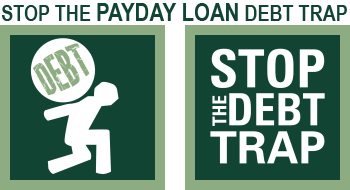Payday loans are marketed as one time ‘quick fix’ consumer loans – for folks facing a cash crunch. In reality, these loans create a long term cycle of debt and a host of other economic consequences for borrowers.
Payday lenders charge 400% annual interest on a typical loan, and have the ability to seize money right out of borrowers’ bank accounts. Payday lenders’ business model relies on making loans borrowers cannot pay back without reborrowing – and paying even more fees and interest. In fact, these lenders make 75 percent of their money from borrowers stuck in more than 10 loans in a year. That’s a debt trap!
Take Action! Support the Veterans and Consumers Fair Credit Act
There’s no wonder payday loans are associated with increased likelihood of bank penalty fees, bankruptcy, delinquency on other bills, and bank account closures.
Hear the stories of borrowers caught in the debt trap of payday loans.
Here’s How the Debt Trap Works
- In order to take out a loan, the payday lender requires the borrower write a check dated for their next payday.
- The payday lender cashes the check on that payday, before the borrower can buy groceries or pay bills.
- The interest rates are so high (over 300% on average) that people cannot pay off their loans while covering normal living expenses.
- The typical borrower is compelled to take out one loan after another, incurring new fees each time out. This is the debt trap.
The average borrower takes out 10 loans and pays 391% in interest and fees. 75% of the payday industry’s revenues are generated by these repeat borrowers. The debt trap is, in fact, the payday lending business model.
We are asking that payday lenders be required to make good loans. There is a pretty simple, widely accepted definition of a good loan: A good loan is a loan that can be paid back in full and on time without bankrupting the borrower. By this definition, banks and other for-profit lenders make good loans all the time. This cannot be done unless the ability-to-repay provision remains.
Overcoming Hurdles to Stop the Debt Trap
In 2017, the Consumer Financial Protection Bureau (CFPB) finalized a rule governing these high-cost loans. In a move contradicting the mission of the agency by then-Director Mick Mulvaney and supported by current Director Kathy Kraninger, the CFPB now wants to rewrite the rule which would remove the ability-to-repay provision and endanger more families to these unfair and predatory loans.
At the heart of the rule is the common sense principle that lenders check a borrower’s ability to repay before lending money. Gutting this rule will only empower the payday loan industry to weaponize their high interest-rate loans against the most vulnerable consumers. Originally when this campaign began, the coalition had called on the Bureau to build on this progress by quickly working to develop regulations to protect consumers from abusive long-term, high-cost loans. Now, it has become abundantly clear that, alongside strong state laws such as rate caps, consumer protections must continue to be defended and enacted.
Learn more about the response to the new rule from consumer and civil rights advocates.
Download a two-pager on the provisions of the 2017 rule.
Rent-A-Bank Schemes
In the 1990s-mid 2000s, predatory lenders partnered with banks to evade state interest rate caps. In response, federal bank regulators — the FDIC, Federal Reserve Board, and OCC – cracked down on this practice. Now, under the Trump Administration, this scheme is reemerging and going unchecked. The FDIC and OCC have even issued proposed rules that could bless this subterfuge, allowing predatory lenders to issue loans of more than 100% APR in states that have interest rates caps of much less ofter around 36%.
Non-bank lenders such as Elevate, OppLoans, Enova, LoanMart, and World Business Lenders currently lend at outrageous rates in states where those rates are illegal under state law, through the use of rent-a-bank schemes with banks regulated by the FDIC or OCC. Neither regulator appears to have done anything to shut down these abuses.
Veterans and Consumers Fair Credit Act
The Veterans and Consumers Fair Credit Act would eliminate high-cost, predatory payday loans, auto- title loans, and similar forms of toxic credit across America by:
• Reestablishing a simple, common sense limit on predatory lending.
• Preventing hidden fees and loopholes.
• Preserving options to address budgetary shortfalls.
• Maintaining low industry compliance costs from compromise rules already in effect.
• Upholding stronger state protections.
Car Title and Installment Loans
Car title and installment loans are variations on the same theme. Car title lenders use a borrower’s vehicle as collateral for their unaffordable loans. Installment loans typically have longer payoff periods and replace slightly lower interest rates with expensive, unnecessary ad-on products.
Take Action! Support the Veterans and Consumers Fair Credit Act
John Oliver Explains the Payday Loan Debt Trap
Learn More
- The CFPB’s Payday Lending Proposed Rule: What Works, What Doesn’t
- Joint Statement Opposing Exceptions to CFPB Payday Rule
- How Predatory Payday Lenders Plot to Fight Government Regulation
- CFPB Must Closely Scrutinize Comments Opposing Proposed Payday Lending Rule
- The CFPB’s 2017 Payday Lending Rule: A Step Forward To Stop the Debt Trap
- Tell CFPB to Keep Protections from Payday Loan Debt Traps
